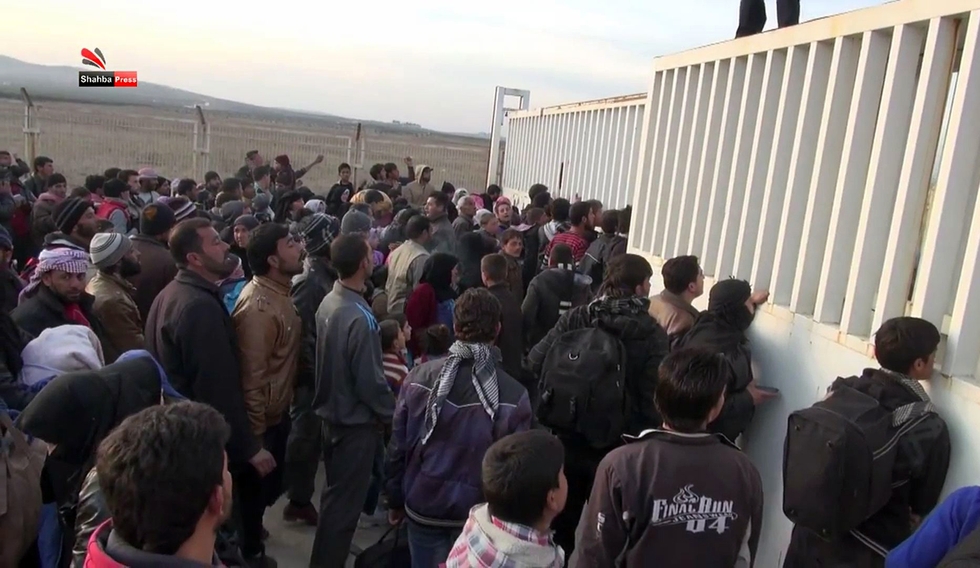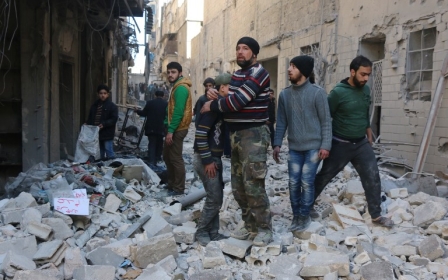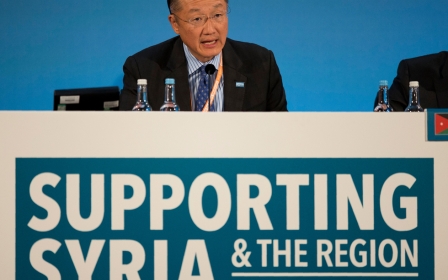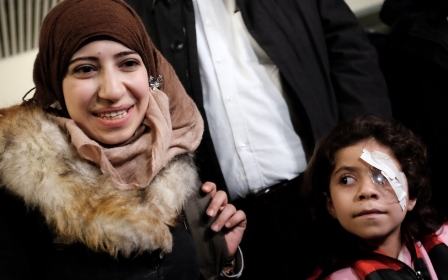Thousands stuck at Turkish frontier in bid to escape battle for Aleppo

Up to 20,000 Syrians fleeing a government advance in northern Aleppo province remained trapped at the Turkish border on Friday.
They are fleeing from a government advance around the city of Aleppo as the head of NATO said that Russian air strikes were undermining efforts to find a political solution to the near-five-year conflict.
The website EA Worldview reported that a woman had been killed after being shot by Turkish security services at the border crossing.
"It is estimated that up to 20,000 people have gathered at the Bab al-Salama border crossing and another 5,000 to 10,000 people have been displaced to Azaz city" nearby, said Linda Tom, a spokeswoman for the UN's Office for the Coordination of Humanitarian Affairs.
She said another 10,000 people were estimated to have been displaced to the Kurdish town of Afrin, elsewhere in northern Aleppo.
"There is currently one IDP [internally displaced persons] camp in Afrin district and plans are under way to expand the camp," she told AFP.
"The fighting has also disrupted major aid and supply routes from the Turkish border," she added.
"Humanitarian organisations are responding to the needs of those displaced, but ongoing military conflict is making access to populations in need increasingly difficult."
The Syrian Observatory for Human Rights, a UK-based monitor that relies on a network of sources on the ground, estimated that at least 40,000 people were attempting to escape as pro-government forces backed by Russian air power threatened to cut off key rebel supply routes from the Turkish border to the north.
"Thousands of people, mainly families with women and children, are waiting to enter Turkey," Observatory director Rami Abdel Rahman told the AFP news agency.
Pro-government troops backed by Russian warplanes also retook a rebel bastion in Daraa used as a launch pad for attacks on the provincial capital, the Observatory said.
According to Iranian media, 25 Iranian troops have been killed in Syria since Monday, including a first lieutenant and a colonel.
Brigadier General Mohsen Ghajarian was among those killed fighting in the ranks of the Iranian Revolutionary Guard Corps and its allied Shia militias.
Aleppo province is one of the main strongholds of Syria's armed opposition, which is facing possibly its worst moment since the beginning of the war in 2011.
"The regime is beginning to reap the rewards of the Russian campaign and its advance in Aleppo is all the more important because it suffered setback after setback in the past two years," Abdel Rahman said.
The ferocity of the advance led to the collapse of UN-sponsored peace talks in Geneva earlier this week, with the US calling for Russia to halt its military campaign in support of Syrian President Bashar al-Assad.
"What we have seen is that the intense Russian air strikes mainly targeting opposition groups in Syria are undermining the efforts to find a political solution to the conflict," Jens Stoltenberg, secretary general of the NATO Western military alliance, said on Friday before talks in Amsterdam with EU defence ministers.
The UN Security Council is due to meet later on Friday with UN Syrian envoy Staffan di Mistura to discuss the faltering peace process.
Turkish Prime Minister Ahmet Davutoglu said on Thursday that up to 70,000 people were heading to his country, with 10,000 already waiting at the border.
His country already hosts about 2.5 million Syrian refugees.
The Turkish border crossing of Oncupinar near Kilis, which faces the Syrian frontier post of Bab al-Salama north of Aleppo, was closed on Friday morning, and there was no sign of any refugee outflow, an AFP journalist said.
Footage released on Thursday by activists showed hundreds of people, including many children, heading towards the Turkish border, some carrying their belongings in plastic bags on their backs.
"We were driven from our homes because of Russia, Iran, Bashar and [Lebanese Shia militia] Hezbollah," a child said in the video. "We ask [Turkish President Recep Tayyip] Erdogan to let us into his territory."
Heavy bombardment
More than 260,000 people have died in Syria's conflict and more than half the population has been displaced.
Aleppo city, Syria's former economic powerhouse, has been divided between opposition control in the east and government control in the west since mid-2012.
Syria's army has been on the offensive since staunch government ally Russia began an aerial campaign in support of government forces on 30 September.
Since then, the government has recaptured several key rebel towns in Latakia province, Assad's coastal heartland, and advanced in Aleppo province and in Daraa in the south.
Hassan Haj Ali, the head of a prominent opposition group called Liwa Suqour al-Jabal that has received US military training in Qatar and Saudi Arabia, said that aerial bombardment against positions was almost constant.
"The Russian cover continues night and day, there were more than 250 air strikes on this area in one day," he told Reuters.
"The regime is now trying to expand the area it has taken control of. Now the northern countryside [of Aleppo province] is totally encircled, and the humanitarian situation is very difficult."
Haj Ali reiterated calls for countries backing Syrian rebels to send more military aid, including anti-aircraft missiles, but said he held out little hope for the latter.
"We demand daily more support, but the issue of anti-aircraft (weapons) has become a dream ... the dream that will not come true," he said.
Meanwhile, both France and Germany told Turkey that it must have better screening of asylum applicants on arrival on the continent, the interior ministers of France and Germany said on Friday.
Speaking in Athens, the ministers warned again of a real "danger" of Europe's Schengen border-free zone collapsing if its outer frontiers were not better protected by, among other things, boosting Greece's capacity to sort "genuine" refugees from economic migrants.
As the first port of call for migrants fleeing war, persecution and poverty across the Mediterranean from the Middle East, Africa and Asia, Greece has received the overwhelming majority of the more than one million arrivals in the last year.
Diplomatic tensions
Top diplomats from countries involved in trying to resolve the conflict are set to meet again on 11 February, but tensions between them remain.
Moscow on Thursday accused Ankara, a key backer of Assad's opponents, of actively preparing to invade Syria, saying it had spotted troops and military equipment on the border.
Meanwhile Saudi Arabia said it was ready to join any ground operation in the US-led coalition against IS in Syria.
"Today, the Saudi kingdom announced its readiness to participate with ground troops with the US-led coalition against ISIL [IS], because we now have the experience in Yemen," Brigadier General Ahmed Asseri told Al Jazeera.
"We know that air strikes cannot be enough and that a ground operation is needed. We need to combine both to achieve better results on the ground."
US Secretary of State John Kerry urged Russia to implement a ceasefire in Syria, saying its bombing campaign was killing women and children in large numbers and "has to stop".
"Russia has indicated to me very directly they are prepared to do a ceasefire," Kerry told reporters, fresh from a trip to Europe focused on resolving the five-year Syrian conflict. "The Iranians confirmed in London just a day and a half ago they will support a ceasefire now.
"We will have a much better sense in the next few days of how serious each party is," added Kerry, a day after he implicitly blamed Russia's bombing campaign against the Syrian opposition for the collapse of peace talks in Geneva this week.
Middle East Eye propose une couverture et une analyse indépendantes et incomparables du Moyen-Orient, de l’Afrique du Nord et d’autres régions du monde. Pour en savoir plus sur la reprise de ce contenu et les frais qui s’appliquent, veuillez remplir ce formulaire [en anglais]. Pour en savoir plus sur MEE, cliquez ici [en anglais].




